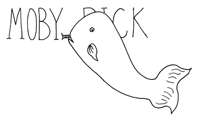STRANGEBUTTRUE- <i>Moby-Dick</i>: Aye, aye, 'twas the book's true name

DRAWING BY DEBORAH DERR McCLINTOCK
Q. What was the biggest publishing mistake with the classic Herman Melville novel Moby Dick, about a ship captain's fatal obsession with a great white whale? –N. Hawthorne
A. As Benet's Readers' Encyclopedia and other literary references attest, the original 1851 name of the novel and whale was hyphenated Moby-Dick, says Mark Davidson in Right, Wrong, and Risky.
Moreover, the original source (of literary and other titles) determines correctness, declared Copy Editor (June-July 2001), a newsletter for the publishing profession. Today, the "incorrect" Moby Dick appears in the Random House Webster's Unabridged Dictionary and also in the title and text of the novel published by the Random House Modern Library. That's a whale of a blunder that history has perpetuated.
Q. Not to be sacrilegious, but in what sense is Google godlike? –S. Brin
A. Google can't love or create or forgive, but it can lay claim to being omnipresent, omniscient, and omnipotent, argues Sally Adee in IEEE Spectrum magazine. Omnipresent? There's Gmail, Google Maps, Google Calendar, Google Earth, Google Mars, Google Apps. "They're all everywhere, all the time," she writes. So, check.
Omniscient? The eponymous Google engine is perhaps as close to a complete index of the sum total of human knowledge as has ever existed. Check again.
Omnipotence is a tougher one, though Google could annoy you in myriad ways, such as frustrating your flailing attempt to find out where the hypoglossus muscle is. Gmail could gobble up your feverish love letters, maps could send you down an endless series of side streets long ago blocked by freeways and housing developments. "Then off you go to the howling wastelands of Yahoo Search and MapQuest!"
In the beginning (1969) was Arpanet, the predecessor of the Internet, culminating in Google in 1998. The average number of web searches per Internet user is 70 per month, 2 out of 3 of them via Google. The online "faithful" include 478 million speakers of English, 384 million Chinese, 137 million Spanish, 96 million Japanese..., numbering more than 1.7 billion, a quarter of the world's population!
Q. How long can a person survive exposed to the vacuum of space? –J. Glenn
A. Sadly, scientists know this rather precisely because in 1971 three Soviet cosmonauts died when a faulty valve caused their Soyuz 11 capsule to depressurize shortly before reentry into the Earth's atmosphere. The cabin pressure dropped to zero for nearly 12 minutes, killing the crew within 30-40 seconds. "You need both oxygen and air pressure to deliver oxygen to the brain," former space shuttle crew surgeon Jonathan Clark explained to Valerie Jamieson of New Scientist magazine.
Briefer spells in a vacuum aren't always deadly, as when a 1966 NASA technician testing a space suit in a vacuum chamber experienced a pressure drop typical of a 36,500-meter altitude (22.7 miles). He passed out after 12-15 seconds, as saliva "boiled" off his tongue. He regained consciousness within 27 seconds after the chamber was re-pressurized, suffering no adverse health effects.
When external pressure drops, gas bubbles form in the blood, damaging the lungs within minutes and the nervous system within hours due to the blood losing nitrogen. A sudden pressure reduction can cause trapped air to explode the lungs within seconds. Concludes Clark, "It is possible to survive near-vacuum for up to a minute, but only if you adopt a gentler approach and have intensive medical care standing by."
~
Send Strange questions to brothers Bill and Rich at [email protected]
#